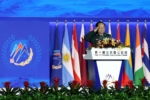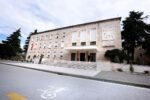Although more than half a year passed after the attack in Banjska, Kosovo, Serbia did not file any lawsuit against Millan Radoicic. The High Public Prosecutor’s Office in Belgrade did not respond to Radio Free Europe’s repeated question about the course of the proceedings against the former vice-president of the Serbian List, who claimed responsibility for the attack on September 24, 2023. In that attack, the Kosovar police officer, Afrim, was killed. The single.
In the last response that REL received on February 8, the Prosecutor’s Office said that it is “verifying the testimony of the suspect” Radoicic. On April 8, the president of France, Emmanuel Macron, spoke about the importance of solving the case in Banjska, during a joint address with the president of Serbia, Aleksandar Vučić, in Paris. The next day, Vucic told reporters that talks with the French president on Kosovo were not easy, but that he thinks Macron “understands Serbia’s position.”
However, he did not mention the results of the investigations into Banjska. “There can be no progress in the dialogue between Kosovo and Serbia, as long as there is a threat that Banjska will be repeated”, says Engjëllushe Morina, from the European Council for Foreign Relations, for Radio Free Europe.
“The perpetrators must be brought to justice, because the security situation must be good, so that the Kosovo-Serbia dispute can be resolved,” she says.
Morina adds that, despite the calls for clarification of the case, the international community is not putting enough pressure on Serbia. “What we are seeing now and in recent years is more about concessions, not so much about obligations,” she says.
What do international officials say?
The President of France, Emmanuel Macron, said on April 8 that his country will ensure that every step of the Ohrid Agreement between Kosovo and Serbia for the normalization of relations is fulfilled. During a joint address with Vucic in Paris, Macron said that “the issue of Kosovo is a promise and a promise for the future of the region”.
He also said that it is important that the participants in the attack in Banjska be arrested. “It is just a confirmation that the Europeans have not forgotten what Vučić would like to be forgotten”, assesses the Serbian foreign policy commentator, Boshko Jakšić, for Radio Free Europe. He adds that the fact that Macron did not raise the issue “privately” shows the importance of the Banjska case.
[Macron] thought he had to say this in front of the public,” says Jakshiq. In his speech, the president of Serbia accused Kosovo of not fulfilling its obligations from the Ohrid Agreement and of not prosecuting cases of attacks against Serbs in Kosovo.
“Everyone already mentions only Banjska”, said Vučić in Paris. On September 24, 2023, an armed group of Serbs attacked the Kosovo police in Banjska, where police officer Afrim Bunjaku was killed. In the ensuing exchange of fire, three more Serb attackers were killed. Kosovo accused Serbia of being behind the organization of this attack, but Belgrade denied it. The responsibility for it was taken by Millan Radoicic, who then resigned from the post of vice president of Lista Serbe, the largest party of Serbs in Kosovo, which has the support of Belgrade.
Morina from the European Council for Foreign Relations assesses that the president of Serbia “is aware that he must take certain actions when it comes to Banjska”. “…but he’s trying to buy as much time as possible until November [the US election], when he hopes the administration in America will change,” says Morina.
She adds that it is very important that European leaders do not ignore the armed attack in the north of Kosovo. “The dispute between Kosovo and Serbia has become a security issue, and a serious one, in the political context in which Europe is located. The Euro-Atlantic community is carefully monitoring the possible instability in the region”, she says.
Is the EU considering punitive measures?
The international community has, several times, called for accountability and demanded that those involved in the attack in Banjska be brought to justice. Brussels did not answer Radio Free Europe’s question whether it is considering imposing punitive measures against Serbia, which Kosovo insists on. The latter considers that it is a matter of terrorism.
Earlier, the EU told REL that it is still awaiting the completion of official investigations by the Kosovo authorities.
“The EU does not independently conduct any investigation into this attack, nor does it have a mandate to do so. The EU has strongly condemned the attacks, offered support to the process and, at the highest political level, has emphasized the need for the investigations to be completed quickly and all those involved to be held accountable,” the Brussels statement said.
Jakšić believes that the demands for the punishment of those responsible will be intensified. “Serbia’s hopes [for that event to be forgotten] are based on the practice implemented by the Government in Serbia, which is a technique to forget things,” he says. He adds that the “relativization” of the Banjska case in Serbia is a short-sighted policy, which “will not pass without consequences”.
The British Foreign Secretary, David Cameron, said at the beginning of the year that dissatisfaction should be expressed for the behavior of the Government of Serbia after the events in Banjska. “We must show that we are disappointed with the behavior of the Government of Serbia. I don’t know if the European Union and the US share this frustration. But from the conversations I have had, I have seen that there is disappointment, because Banjska was a moment of great danger,” Cameron said on January 9.
The US envoy for the Western Balkans, Gabriel Escobar, said that the US is investigating Serbia’s links to the attack in Banjska. “We think there were some financial and organizational connections, but we are investigating it as a whole,” Escobar said in an interview with Radio Free Europe on March 15. He also said that it is unacceptable that Radoicic is still free.
What did Serbia do so far?
After claiming responsibility for the attack in Banjska, Radoicic spent a day in detention in Belgrade. He was arrested on October 3 on charges of “complicit criminal offences: illegal production, possession and trafficking of firearms and explosives, as well as serious crimes against public security”.
He was released a day later, on the condition that he not leave Serbia. The Office of the High Public Prosecutor in Belgrade told Radio Free Europe on February 8 that, in cooperation with the police and customs, “it is gathering evidence to determine the origin of the weapons and the channels through which they entered Kosovo.”
The institutions of Serbia did not answer whether anyone other than Radoicic was involved in the investigations. Earlier, the president of Serbia said that he will come up with proposals for indictment “at the right time”. “This is the work of the competent prosecutors, we will see what crimes are involved, and in what way,” Vucic said on February 2.
Until the attack in Banjska, Radoicic was one of the leaders of the Serbian List, which the president of Serbia described as “the defender of the Serbian people in the north of Kosovo”. Recently, a photo appeared on social networks, where Radoicic is seen in the company of the Serbian ambassador in Washington, Marko Gjuric, in a restaurant. It is not known when and where the photo that was published on the X network on March 9 was taken. It is also not known who the author is.
Djuriq, who after the publication of the photo stated that he “is not ashamed of his contacts”, did not answer the questions of Radio Evropa e Lire about the details of the meeting with Radoicic. The President of Serbia said on March 10 that “he did not ask Djuric when, where and why” the photo was taken.
What do they say in Kosovo?
It is assumed that Radoicic is in Serbia. Official Pristina requests his extradition, so that he can be tried in Kosovo for terrorism. Belgrade replies that this is “impossible” and that Radoicic will be tried by local courts. The High Public Prosecutor’s Office in Belgrade did not even answer the question of whether Serbia is ready to cooperate with the institutions of Kosovo and the international community for the clarification of this case.
In Kosovo, there is still no indictment against Radoicic, although it has been warned that it will be filed by the end of March this year. The Minister of Justice of Kosovo, Albulena Haxhiu, said earlier that she joins the calls of the Prime Minister of Kosovo, Albin Kurti, that the case of Banjska should be urgently processed by the competent institutions.
In December 2023, the International Police Agency (INTERPOL) issued an arrest warrant for Radoicic./Rel/







